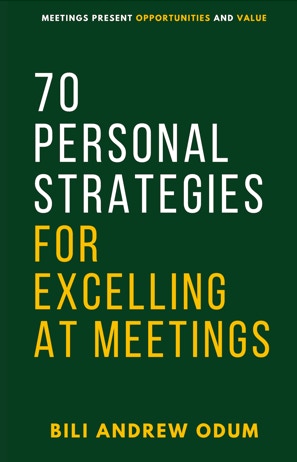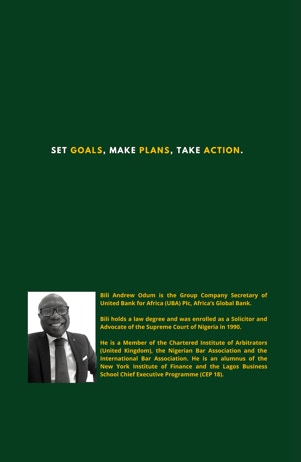
Rose Okwechime
Mrs. Rose Okwechime is an accomplished professional in banking and finance. She previously served as the Managing Director & Chief Executive Officer of Abbey Mortgage Bank Plc, one of the few mortgage firms quoted on the Nigerian Stock Exchange. She was also a Non-Executive Director of United Bank for Africa Plc, and Chairman of the Nominations and Governance Committee of the Board.
How to Excel at Meetings by Rose Okwechime

What follows are a few of my most cherished strategies that have helped me very well over the years to succeed at meetings.
First, and top on my list, is the simple, but not easy, habit of being punctual at all meetings. Being punctual, in my view, expresses the importance you attach to the meeting. Arriving well ahead before the meeting commences, gives me ample time to unhurriedly settle down and further organize my thoughts on the matters for discussion. Arriving early also affords me the time to study and constructively engage others who are attending the meeting, exchange pleasantries and possibly assess the likely direction of discussions.
Unpunctuality is a no-go area for me. On those rare occasions, when I step into a meeting that has already commenced, I find that my late arrival unfairly disrupts the meeting. Also, I can feel the eyes of everyone focused on me no matter how quietly I try to tiptoe into the meeting room. It is even worse if I am on the high table. For coming late, I have sadly lost all the opportunities and gains of being punctual. When I am late, and the meeting has started, I make sure that I apologize for my late arrival as soon as I get an opportunity, as long as it does not further disrupt the meeting. Avoid unpunctuality as it attracts no commendations.
Second, I prudently study the meeting papers no matter how enormous (and they usually are) and how much little time I have to go through them all. If I am pressed for time, I adopt the shortcut method of quickly going through the agenda, the minutes and the matters arising from the previous meetings. I would thereafter pick the most important topics and study them. It is always important that you thoroughly review the meeting papers. I endeavor to give good quality time to this necessary pre-meeting phase. It is not always required that you must ask questions or make a speech at the meeting but it is very important that you follow the matters being discussed and evaluate everyone’s contributions at the meeting, in the light of your pre-meeting preparation. Another point on this, as an aside, If one really wishes to speak, raise your hand till you are invited to speak and make your remarks brief and to the point.
Third, I take copious notes on important matters so that during question time, l can easily refer to my detailed notes to ask and seek further clarification to questions and comments that I have. I only speak on points in my note that have not been raised or addressed by others. My rule is, “If the important topics have been addressed by others, please keep your peace.” My notes also serve as my personal record for future reference purposes. I also take notes so that if I am personally called up to address a particular topic, it would serve as my aide as I make my contribution in a structured manner.In closing, I need not say that I must be dressed impeccably for every meeting. My rule on this is, “You must have a distinct dress code for each type of meeting.” The type of meeting, (formal or informal, religious or non-religious, business or non-business, etc.,) would invariably dictate the appropriate appearance. Strive to look professional and responsible, and you would get it right all the time.

